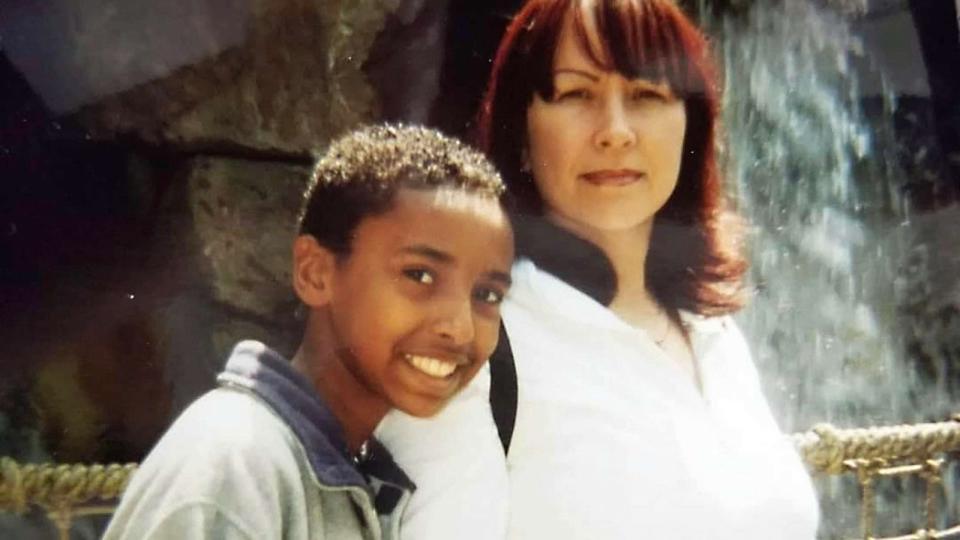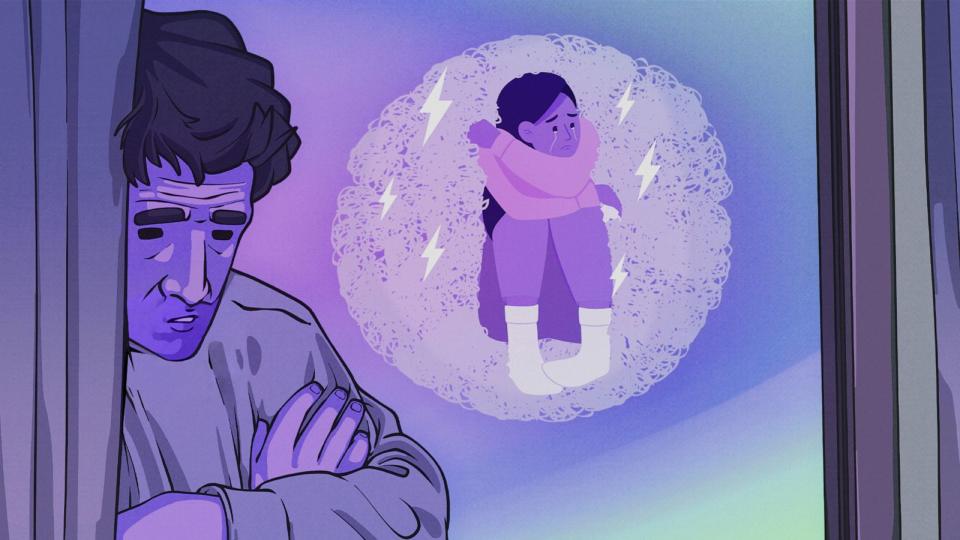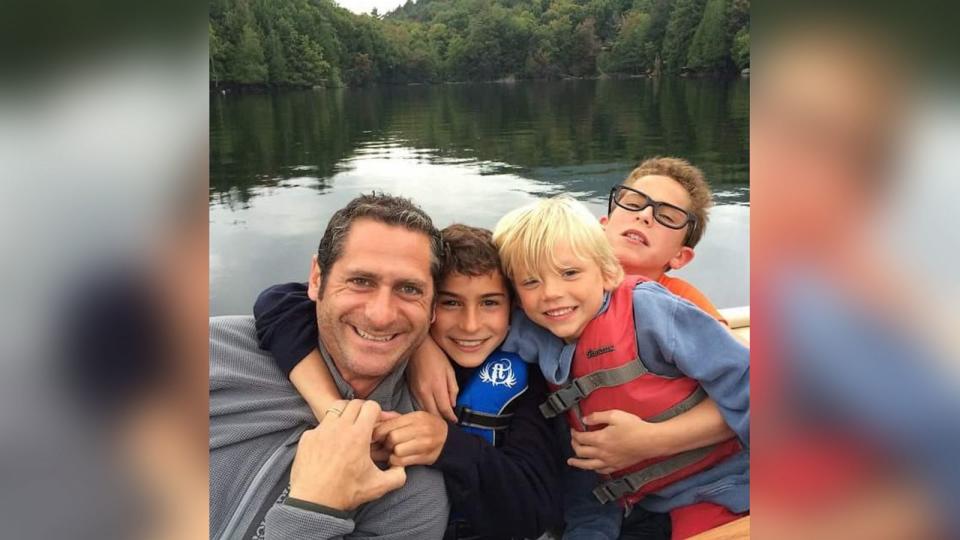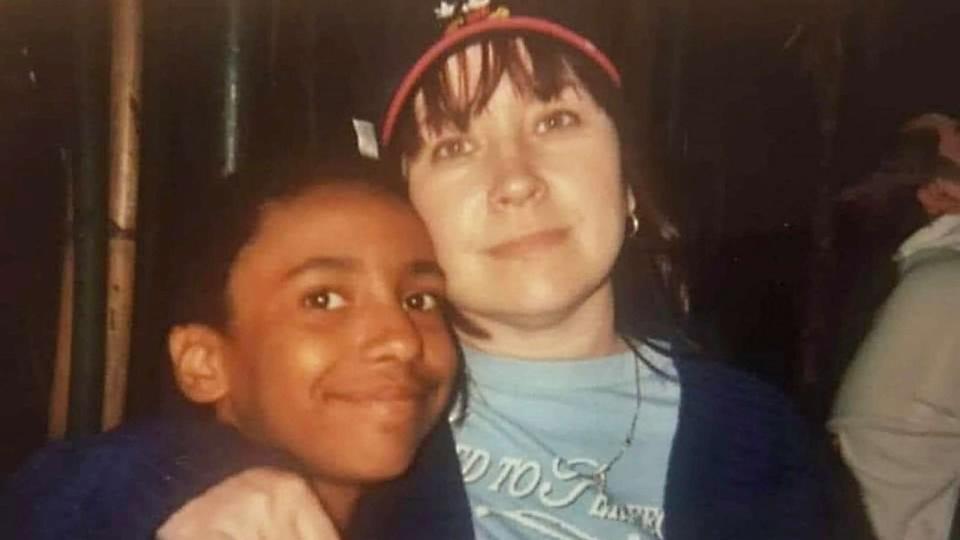Parents say they're struggling with their own mental health amid a growing youth mental health crisis
Michelle Gonzales-Reed's son Dajon was in high school when she said she began noticing signs of mental health struggles in her teen son, signs that included a lack of interest in friendships and activities, to staying in bed all day.
Over the next few years, as Gonzales-Reed tried to care for Dajon as his mental health declined further, she said she, too, began to suffer from mental health issues, for the first time in her life.
"Some of the stuff I dealt with was impaired concentration or difficulty sleeping, irritability and fatigue, which are all symptoms of generalized anxiety disorder," Gonzales-Reed, who lives near Fresno, California, told "Good Morning America." "I don't think I really realized that was what was happening to me because I was too focused on him."
Gonzales-Reed said that even though she works in the mental health field as a licensed marriage and family therapist, she ignored her own mental health struggles because it was too much to handle on top of working full-time, being a single mom of two and caring for Dajon's mental health.
When Dajon passed away in 2019, Gonzales-Reed said she believes his mental health struggles were a factor. Following his death, Gonzales-Reed said she began suffering from post-traumatic stress disorder and prolonged grief.
She said it took her as long as one year after Dajon's death to seek mental health assistance for herself.
"I knew I had to get myself okay again," Gonzales-Reed said of finding professional help. "I had to pull it together. but it is still really hard every day. There is not a day that I don't think about my son, and that I don't miss him very much."

Gonzales-Reed's story is one that is not always told, but which data shows is very common.
Over the past three years, headlines have proclaimed the news of a growing youth mental health crisis in the United States. But the lesser-told flipside of that youth mental health crisis, experts say, is the parents who are also struggling with their own mental health.
'Sounding the alarm' about a parents' mental health crisis
Research released earlier this year shows that parents and teenagers are suffering from anxiety and depression at nearly the same rate.
"In our data, if you're a depressed teen, you're about five times more likely to have a depressed parent. If you're an anxious teen, you're about three times more likely to have an anxious parent," Dr. Richard Weissbourd, a psychotherapist on the faculty of Harvard's Graduate School of Education and director of the university's Making Caring Common Project, which conducted the research, told "GMA."
MORE: As new data shows kids in a mental health crisis, parents ask, where is the help?
In 2021, a report from U.S. Surgeon General Dr. Vivek H. Murthy warned of a growing mental health crisis among young people. The report, issued during the coronavirus pandemic, cited statistics including a 51% increase in emergency room visits for suspected suicide attempts among girls and a doubling of anxiety and depression symptoms reported across genders.

According to data collected last year by the Making Caring Common Project, nearly 40% of teens surveyed reported being at least "somewhat worried" about the mental health of at least one of their parents, and more than one-third of teens had at least one parent who reported anxiety or depression. Additional data shared by the Centers for Disease Control and Prevention shows that one in 14 kids in the U.S. has a caregiver with poor mental health.
"We would just be as right to sound the alarm about a parent mental health crisis as a teen mental health crisis," Weissbourd said. "I don't think we're going to get very far with teens unless we also support the parents."
Part of the explanation behind the data showing parents struggling with their mental health alongside their kids has to do with biology, Weissbourd said. Having a close relative, like a parent, with a mental disorder puts one at a higher risk for mental health struggles, according to the National Institute of Mental Health.
But equally important, Weissbourd and other experts say, are environmental factors, which for parents can be anything from the stresses of daily life, to the stress of watching their child struggle with a mental health disorder.
Jay Crosby, a father of three in Connecticut, said he struggled mentally and emotionally with the loneliness that comes with being a parent of a child with mental health issues. In his case, he said his two oldest sons, now 21 and 19, struggled early on with their mental health.
"I cannot express how lonely this journey is," Crosby told "GMA." "People don't send food deliveries and packages and flowers and there's no calls of condolences. Their understanding is judgment. It's judgment of you as a parent and it's judgment of your ability to 'control your kid,' and it just makes it very lonely. I can't say that enough."

Crosby said that when his kids were younger, he struggled to find time to take care of himself as he devoted his energy to helping them with their mental health struggles. When he did find time for himself, he said he turned to "escapism," which for him meant drinking alcohol.
Crosby said that for years he didn't seek help for his self-described alcoholism because it "wasn't a pressing need."
"We say you've always got to put yourself first, but you still can't. It's really hard to do that," Crosby said, comparing it to being told on an airline flight in an emergency to put the oxygen mask on yourself, the parent, first, before helping your child.
"You know you need to put the oxygen mask on first but your hands are kind of caught in the chair and the only thing you can do is assist your child," said Crosby. "Even though you know you can get [the oxygen mask]. Even though you know it's there for you, you still reach for your child's [oxygen mask] first."
Dr. Christine Crawford, a practicing child and adolescent psychiatrist at Boston Medical Center, said that parents like Crosby and Gonzales-Reed are by no means alone. In her practice, she said she's seeing a rise not only in the number of kids with mental health struggles, but also in the number of parents and caregivers who are trying to help them.
"Parents almost find themselves in this position in which they feel overwhelmed and hopeless," Crawford, also associate medical director for the National Alliance on Mental Illness (NAMI), told "GMA." "They continue to see their kid struggling, and they're like, 'I'm putting in all this time and I'm not seeing the change,' and therefore they feel that it reflects poorly on them as a parent but then also on them as a person ... all these negative thoughts start to afflict them."
How parents can find help
Crawford said that given the crisis she sees amongst both kids and parents, she uses the beginning of each therapy appointment to simply ask the parent or caregiver how they are doing.
"For many parents, there often times aren't a lot of spaces and opportunities for them to reflect on themselves and what it's been like to be in this caregiver role because everyone is so focused on the well-being of the kid, which is totally appropriate," Crawford explained. "If you are routinely interacting with teachers, pediatricians, people don't spend a lot of time checking in on you."
Crawford said the effort is meant to first help the parent be able to help themselves, but also to help the parent be capable of supporting their child's mental health.
"The reality is that kids are spending the majority of their time with their caregiver, not with us as practitioners," she said. "So the work that we are doing as providers is not going to be 100% successful if we know that we're sending our kids home to an environment in which their caregivers are struggling each and every day."
Similarly, Weissbourd said that parents seeking help for and talking about their mental health can be a good model for kids, and vice versa.
"Parents often have a lot of wisdom, as they know a lot about anxiety and depression and they know a lot about how to cope with anxiety and depression," he said. "And this may be the most psychologically aware and articulate group of teenagers in our history who have a very wide vocabulary for talking about mental health challenges. And in general, teens don't feel the same stigma that their parents do, so there are many cases where teens can also be helpful to their parents."
MORE: Mom whose daughter died by suicide says parents need to talk with their kids
Crosby said he finally engaged professional help to address his mental health, but also found support by connecting with other parents. When his eldest son was 16, Crosby said he began to participate in parent support meetings through what is now known as Mental Health America, a nonprofit organization.
"It really is remarkable how many people say they're grateful for this group because they just didn't know that there were other people like us out there, because you don't talk about it," Crosby said, adding he has seen there remains a stigma especially for fathers like himself struggling with mental health. "Still, mental health isn't spoken about enough."
Crosby continues to attend parent support meetings and now serves as a facilitator. He said he has learned over the years that there will be good days and bad days on one's mental health journey, and when times are good, parents especially have to focus on themselves so they can be prepared emotionally for the darker days.
Gonzales-Reed said if she could do something differently in her journey, she would have reached out to groups like NAMI and The Jed Foundation, a a youth mental health-focused nonprofit organization, for resources on parenting a child with a severe mental illness.

"You have to reach out to groups that are there and use them," Gonzales-Reed said. "And if you go to groups, you're going to hear other people talk about their loved ones and what they're dealing with and it's going to help you."
Crawford encourages parents and caregivers to schedule time with each other, away from their kids, so that they can have real conversations about topics like mental health that may be difficult to broach on a playground or in a school pickup line. She also said all adults, but particularly parents and caregivers, need to make an annual appointment for themselves with their primary care provider, just as they would schedule an annual wellness visit for their child.
"[Primary care providers] are accustomed to talking about routine mental health-related issues and they can point you in the right direction to where you can receive support," Crawford said. "It is also normal to call your PCP to schedule an appointment for a mental health concern ... you can call and be seen within a week, the same way that you would for a physical concern."
If you or someone you know are experiencing suicidal, substance use or other mental health crises, please call or text 988. You will reach a trained crisis counselor for free, 24 hours a day, seven days a week. You can also go to 988lifeline.org.
Editor’s note: This report has been updated to clarify Gonzales-Reed’s work in mental health advocacy.
Parents say they're struggling with their own mental health amid a growing youth mental health crisis originally appeared on goodmorningamerica.com

